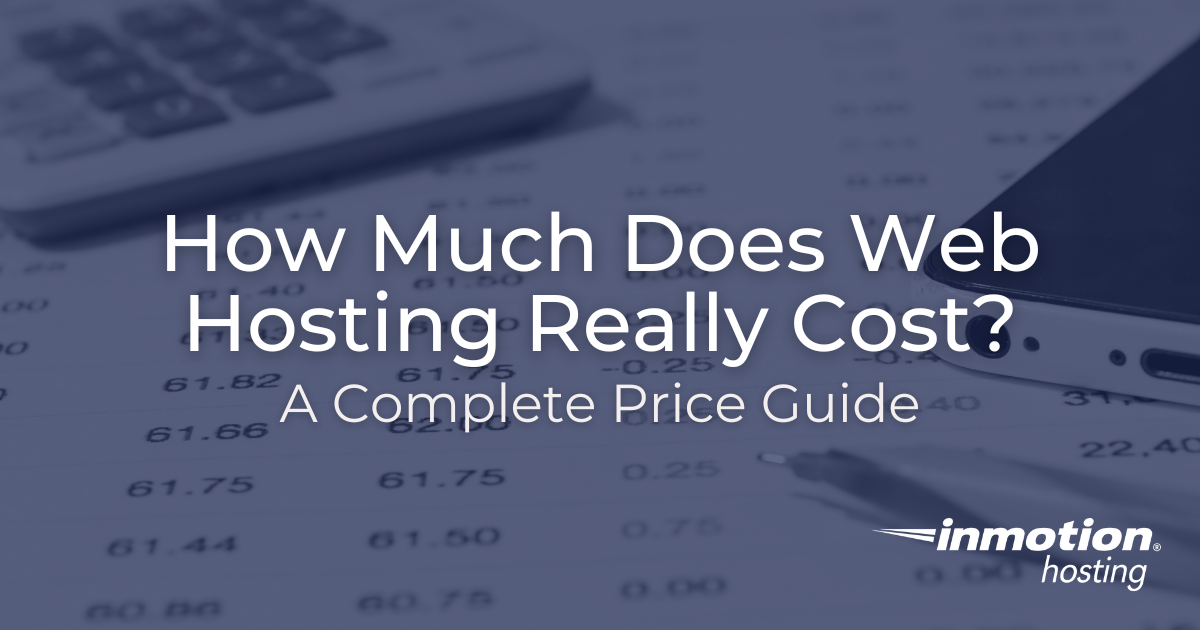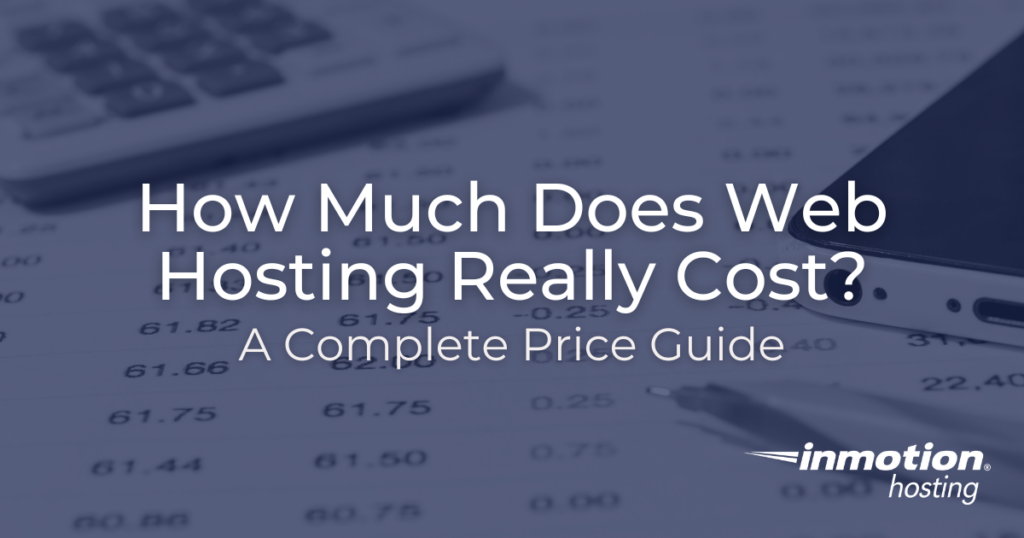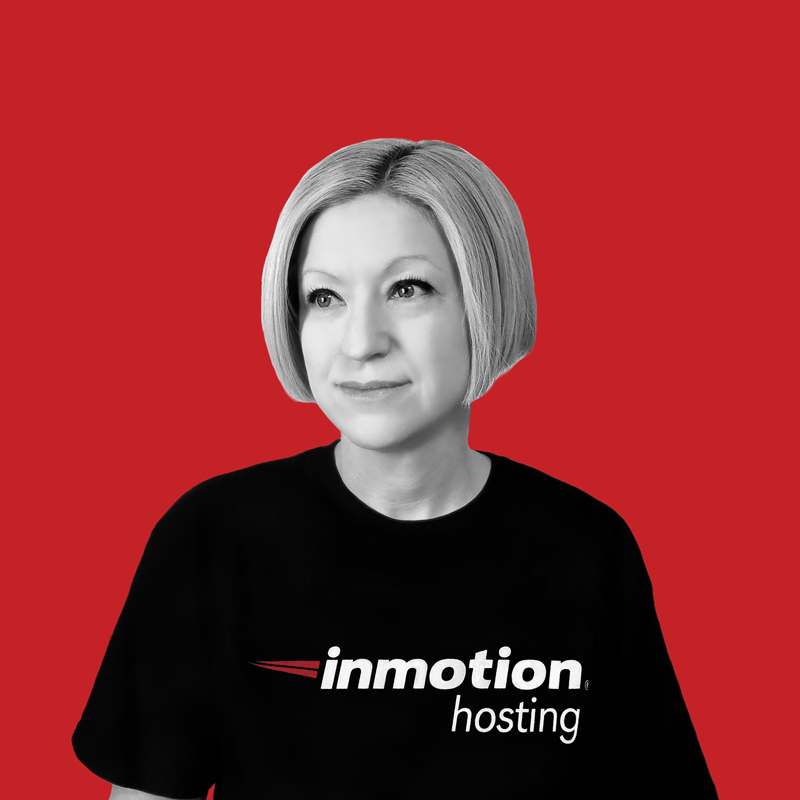
Cost of Web Hosting: A Complete Price Guide

In 2025, you can expect to pay between $3–$300 per month for web hosting. But the final figure depends on various aspects: website size, the CMS you’re using, performance requirements, and the plan you prefer – shared, VPS, or dedicated.
Whether you’re a new blogger, a small business owner, or running an e-commerce website, knowing hosting costs, both obvious and hidden, is important. And we’ll help you with that!
In this guide, we will break down the costs for each type of hosting, discuss factors that impact the pricing, and give you a clearer picture of what to expect as you develop and grow your online presence.
If you need reliable web hosting at a decent price, check out InMotion Hosting. We offer flexible plans to fit your needs – no matter if you’re just starting or if you’ve already got a thriving site.
Web Hosting Pricing by Type: Compare Your Options
There are various web hosting types, each with a different price range. Here’s a quick rundown:
1. Shared Hosting ($2.49-$15/month)

Shared hosting is a budget-friendly option for small businesses and those just starting. It works by hosting multiple websites on the same server, which helps keep costs low.
Here’s a quick overview of shared hosting costs:
- Entry-level costs: Shared hosting packages start from as low as $2.49 per month. However, be prepared to pay more as your needs grow. Costs typically rise as you upgrade your plan to include more resources, like additional storage or better customer support.
- Business-class hosting pricing: If you’re running a small business, shared hosting can still be a solid choice. As your website grows, upgrading to a business-class shared hosting plan gives you better performance, additional features like SSL certificates, and more storage.
In fact, 81% of InMotion Hosting’s shared hosting customers are small businesses with 2-9 employees. This data point highlights the appeal of shared hosting for companies that don’t yet need the power of a dedicated server but still want reliable service.
Looking for affordable shared hosting that doesn’t compromise on speed? InMotion Hosting offers business-class plans with NVMe SSD storage for enhanced performance.
2. WordPress Hosting ($3.29-$29.99/month)

When it comes to WordPress hosting, you have two main options:
- Managed WordPress hosting: This type costs a bit more, around $15 to $29.99 per month. That’s because it comes with a suite of services designed to make your website run smoothly with minimal intervention. For example, automatic updates, daily backups, enhanced security, and optimization essentials.
- Unmanaged WordPress hosting: The more affordable option, ranging from $3.29 to $15/month, leaves you in charge of managing the technical aspects of your site, such as software updates and performance enhancements. It’s ideal for those who possess technical knowledge or seek full control over their WordPress sites.
One key difference between managed and unmanaged hosting is the way resources are allocated. Managed hosting typically offers more robust resources, such as optimized servers and automatic scaling to meet traffic spikes. Meanwhile, unmanaged hosting tends to be more basic, with fewer built-in optimization features.
Another consideration is whether you choose shared hosting optimized for WordPress vs VPS hosting optimized for WordPress. These costs typically follow those of Shared hosting and VPS, but with WordPress optimization. For example,
For those seeking hassle-free, optimized hosting, InMotion Hosting is a great choice. Our WordPress hosting plans include pre-installed security features and optimization tools. The result? Your site stays fast and secure.
3. VPS Hosting ($19.99-$99.99/month)

VPS (Virtual Private Server) hosting provides more control, flexibility, and resources than shared hosting. That’s why a significant portion of VPS customers (around 30.58%) are web developers or designers, as per InMotion Hosting’s customer data.
Similar to WordPress hosting, VPS hosting offers two types:
- Managed WordPress hosting: This option usually falls in the range of $15 to $29.99 per month. The higher cost is justified by the convenience it offers. With managed hosting, you’ll enjoy features like automatic updates, daily backups, enhanced security measures, and performance optimization tools.
- Unmanaged WordPress hosting: Ranging from $3.29 to $15 per month, unmanaged WordPress hosting gives you full control over the management of your site. This is an ideal choice for those with technical knowledge who want to take charge of updates, performance tweaks, and overall management.
One key benefit of VPS hosting is scalability. As your website grows, you can easily upgrade your resources (like CPU, RAM, and storage) without migrating to a new server. This flexibility allows for cost efficiency – you only pay for what you need.
Pro Tip: To ensure optimal performance and hassle-free management, consider choosing InMotion Hosting’s managed VPS. With expert SysAdmin support through Launch Assist, you can focus on your business while InMotion’s team handles the technical details.
4. Dedicated Server Hosting ($99.99-$499.99/month)

Dedicated server hosting is a type of web hosting where an entire physical server is allocated to a single user or business. For this, the pricing range can vary significantly based on the level of service and resources needed.
At the entry level, you’ll find setups starting at around $99.99 per month. These plans come with all the basic configurations.
On the other hand, enterprise-level servers can cost anywhere from $250 to $499.99/month. These offer more powerful hardware, higher RAM, and advanced security features and suit large-scale businesses or websites with heavy traffic demands.
Dedicated servers often come in both managed and unmanaged options. Managed services include expert support, regular maintenance, software updates, and enhanced security, all of which add to the cost. Meanwhile, unmanaged servers, though more affordable, require the user to handle server configuration, updates, and troubleshooting on their own.
If you’re operating a large-scale business and want dedicated server hosting, opt for InMotion Hosting. We offer robust, U.S.-based support available 24/7/365 for our dedicated server clients.
Migration and Upgrade Costs: Planning Your Hosting Journey
Want to switch your hosting provider or upgrade to a new plan? In that scenario, you must factor in all the associated costs to make a smart decision.
Let’s break down the key financial considerations that impact your hosting transition:
Cost Comparison Between Hosting Types
The cost of migration/update can vary depending on the hosting solution you choose:
- Shared hosting: This is the most budget-friendly option, with basic migration services often available for free or at a low cost. Upgrading typically involves moving to a VPS or dedicated server, which can charge higher fees due to the increased resources required.
- VPS hosting: Virtual Private servers offer more flexibility and control than shared hosting. Migration costs are generally moderate, as the provider might charge a one-time fee for transferring your site or offer an assisted migration service. Upgrading within VPS hosting can involve moving to a higher-tier plan, which increases the cost.
- Dedicated hosting: With dedicated servers, the costs can climb significantly, both for the initial setup and for any migrations or upgrades. Providers often offer migration services at a premium, especially if you need to transfer large or complex websites.
- Managed WordPress hosting: This specialized hosting for WordPress sites tends to offer the most hands-on support, including managed migrations and upgrades. While the initial cost is higher, many managed WordPress hosts (like InMotion Hosting) provide free migration assistance as part of their service package.
Migration Service Fees and Timelines
Many hosting providers charge a fee for website migration, which can range from as little as $50 to several hundred dollars. It depends on the size and complexity of your site. However, some hosts like InMotion hosting offer migration services for free.
In terms of timelines, a simple migration can take as little as a few hours, while larger websites might require a few days for a smooth transfer. Be sure to confirm these details with your hosting provider, as delays in migration can lead to increased downtime or unexpected costs.
Data Transfer Costs
When it comes to data transfer, many web hosts include a certain amount of bandwidth as part of your hosting plan. However, once you exceed this limit, you may face additional costs. These fees can vary significantly depending on your hosting provider, plan type, and the volume of data transferred.
Additionally, the cost of data transfer can be affected by the geographic location of your website’s audience. Hosting services with global data centers may help minimize transfer costs, as they allow data to travel through short distances.
Downtime Considerations
During migrations or plan upgrades, downtime can occur. While it may seem like a minor detail, the financial impact can be significant, especially for businesses that rely heavily on their website for revenue generation or customer engagement.
Choosing the right hosting provider can significantly reduce the risk of extended downtime. Many top-tier providers, such as InMotion Hosting, prioritize uptime reliability and offer dedicated support during migrations to help you get your website back online as quickly as possible.
InMotion hosting offers free website migrations with expert transfer assistance to ensure minimal downtime. This can save you both time and money.
Managing Multiple Websites: Cost Considerations for Agencies and Resellers
Here’s what to consider when evaluating hosting costs for multi-website management:
Multi-Site Hosting Solutions
For agencies, developers, and resellers managing multiple websites, a standard shared hosting plan may not be enough. Multi-site hosting solutions offer a more scalable and efficient way to handle numerous projects under one roof.
Let’s have a look at hosting types that facilitate multiple websites:
- Shared hosting: Shared hosting is the most budget-friendly option for hosting multiple websites, especially when you’re starting. However, it comes with some limitations in terms of performance, especially if your websites experience high traffic or requires more resources.
- VPS hosting: Virtual Private Server (VPS) hosting provides more control and resources than shared hosting. With VPS, each site gets a dedicated slice of the server, which ensures better performance, security, and scalability.
- Dedicated hosting: For high-traffic websites or larger agencies, dedicated hosting offers maximum control and power. Using this solution, you rent an entire server exclusively for your websites.
- Cloud hosting: Cloud hosting provides flexibility and scalability, allowing you to add more resources easily as your needs grow. It’s perfect for resellers and agencies handling multiple websites with varying traffic demands.
- Managed WordPress hosting: If you’re dealing with multiple WordPress sites, managed WordPress hosting can simplify the process. These plans offer multi-site capabilities, making it easier to manage multiple WordPress websites from a single dashboard.
Reseller Hosting Pricing

When it comes to reseller hosting, pricing can vary widely based on several factors:
- Number of sites you plan to host
- Resources needed (such as bandwidth, storage, and CPU power)
- Addons like SSL, extra emails, etc
Entry-level reseller hosting can start as low as $1 per month. It offers basic features, including limited disk space, bandwidth, and access to control panels like cPanel or WHM.
For those with larger operations or more demanding clients, high-tier reseller plans can go upwards of $100 to $200 per month. These premium plans typically come with enhanced support, dedicated IP addresses, and more extensive management tools.
Client Management Tools
When managing multiple websites for various clients, having the right client management tools can significantly streamline operations. These tools help agencies and resellers track their clients’ accounts, manage billing and support requests, and monitor overall website performance:
- WHMCS – Helps with billing and automation of client management tasks
- Zoho CRM –Track client interactions, manage sales pipelines, and provide personalized support.
- Freshdesk – Offers a customer support solution with integrated ticketing, live chat, and automated workflows
If you’re looking for a solution that covers all of these bases, check out InMotion Hosting. Our Reseller Hosting plans include WHMCS for client billing and management to ensure you can manage your clients efficiently.
Bulk Discount Opportunities
Many hosting providers offer discounts when you purchase multiple hosting plans or sign up for extended contract periods. These discounts are especially valuable for agencies, resellers, or businesses looking to streamline their expenses without compromising quality.
Understanding Web Hosting Cost Factors
Several critical factors influence the final price you’ll pay, and understanding these can help you make a more informed decision for your website needs:
Bandwidth Requirements
Your bandwidth needs depend on your website’s traffic volume and the type of content you serve.
For instance, a simple blog with 10,000 monthly visitors might only need 50GB of bandwidth, costing $5-10 monthly. However, an e-commerce site with high-resolution images and video content serving 100,000 monthly visitors could require 500GB or more, pushing costs to $30-50 monthly.
Many entry-level plans now offer “unlimited” bandwidth, though they still have practical limits based on server resources.
Storage Space
Storage allocation varies significantly across hosting plans. Basic shared hosting typically offers 10-50GB, which is sufficient for small websites.
However, if you’re running an eCommerce site with numerous product images or a media-rich platform, you might need 100GB or more. Of course, the added storage adds to the cost as well.
Improve the performance and security of your store with specialized eCommerce Hosting. Get faster speeds for your online store with NVMe storage, server protection, dedicated resources, and optimization tools.
99.99% Uptime
Free SSL
Dedicated IP Address
Managed Server
eCommerce Hosting
Number of Websites
Most hosting providers structure their plans based on the number of websites you can host. Single-site plans are the most economical, starting around $3-8 monthly.
But if you need to host multiple websites, costs increase substantially. Multi-site plans typically start at $15-25 monthly, with each additional website potentially adding $5-10 to your monthly bill.
Security Features
On average, a website experiences around 94 attacks each day[1]. Considering that, having security features is essential. And each feature adds up to the cost you’ll pay.
The essential security add-on includes:
- SSL certificates
- Firewalls
- Malware scanning
- DDoS protection
Support Level
The level of customer support provided by your hosting company can significantly impact both your experience and costs. Plans that offer 24/7 live support, dedicated account managers, or specialized technical assistance generally come at a premium.
If you’re a small business owner or a non-technical user, it’s worth considering the added value of premium support.
Performance Needs
Websites requiring faster load times and superior performance (such as high-traffic sites or those with complex functionality) may need plans with advanced performance optimizations. These include caching, content delivery networks (CDNs), and enhanced server technologies – all increasing the hosting costs.
Scaling Costs: Planning for Business Growth
Your web hosting needs to grow with your business. What starts as a simple website on shared hosting may eventually require more resources, leading you to consider upgrading to more powerful plans like VPS, cloud, or even dedicated servers. It’s important to plan for these changes early so you don’t face unexpected costs or downtime when scaling.
Here’s a quick guide:
Growth Milestone Cost Triggers
When your business reaches specific milestones, you may need to upgrade your hosting plan to accommodate growth. These milestones typically include:
- Increased website traffic: As more visitors come to your site, your hosting plan must be able to handle the surge in traffic.
- Expanded content and features: If you add more pages, videos, or complex features, your resource requirements will increase.
- eCommerce growth: Scaling your online store may require enhanced performance to support inventory management, transactions, and customer experience.
Resource Upgrade Pricing
The cost of upgrading resources like storage, bandwidth, or processing power varies between hosting providers. Typically, you’ll see pricing tiers based on the resources you require:
- Storage upgrades: Adding more space to accommodate growing files, databases, or media.
- Bandwidth upgrades: Increasing your site’s data transfer limits as traffic grows.
- CPU & RAM upgrades: Ensuring your site performs well under the strain of more visitors and complex processes.
It’s important to compare upgrade costs across hosting providers to determine the best plan for your budget.
Traffic Scaling Costs
As traffic increases, your hosting needs will change. Shared hosting, which is cost-effective for small websites, may not be sufficient for high-traffic websites. At this point, you might need to transition to more robust options like VPS (Virtual Private Server) or dedicated hosting.
These plans often come with higher costs but offer greater control, speed, and security to handle surges in traffic.
Long-Term TCO Analysis
Total Cost of Ownership (TCO) encompasses all the ongoing costs associated with maintaining, upgrading, and scaling your hosting solution over time. Consider these factors:
- Annual renewals: Hosting plans often come with renewal fees, which can increase over time as your needs grow.
- Support costs: Higher-tier plans often include premium customer support.
- Security upgrades: As your business grows, security becomes more critical. Investing in SSL certificates, firewalls, and backup solutions can add to your overall TCO.
Want flexibility and seamless scaling as your business grows? InMotion Hosting offers plans with easy upgrade paths, which ensures you’re always ready for the next phase of your business journey.
Hidden Costs That Impact Your Total Web Hosting Budget

Several hidden costs impact your total web hosting budget, for example:
- Domain registration: While many hosting providers offer a free domain for the first year, you will typically pay between $10 and $15 annually to renew it.
- SSL certificates: Some hosts offer basic SSL certificates for free, but more advanced or extended validation certificates may cost up to $299 annually.
- Email hosting: If you want professional email addresses associated with your domain (e.g., [email protected]), email hosting is an added cost. This typically costs around $1-$5 per mailbox (monthly).
- Backup services: While basic backups might be included in the hosting plan, comprehensive backup solutions often come at a premium:
- Daily automated backups: $3-20 per month
- Extended backup retention: $15-100 per month
- One-click restore features: These may require a premium plan upgrade
- Migration services: Many hosts charge a one-time fee for professional migration services, ranging from $25 to $200. The final price depends on the complexity of the migration.
- Resource upgrades: As your website grows, you may need to upgrade your hosting resources like bandwidth, storage, or processing power. These upgrades can vary in cost depending on the hosting plan and provider.
Security and Compliance Investment

Beyond web hosting, you must also invest in essential security features to keep your site protected. These include:
DDoS Protection Pricing
Distributed Denial-of-Service (DDoS) attacks flood a website with massive amounts of traffic, forcing the server to go offline. To prevent this, many hosting providers offer free DDoS protection, which covers small attacks.
However, if you run a high-traffic website, you must opt for a separate premium DDoS protection. The prices can range from $10 to $300 per month.
Malware Scanning Costs
Malware can harm your website, gain unauthorized access, and steal your customers’ information. Some hosts offer free malware scanning, but premium services with automated removal and enhanced security features can cost between $5 and $50 per month.
PCI Compliance Requirements
If you handle online payments, compliance with the Payment Card Industry Data Security Standard (PCI DSS) is essential. While some hosting providers include PCI-compliant environments in their plans, dedicated compliance solutions can cost anywhere from $20 to $200 per month.
Security Audit Costs
A security audit evaluates vulnerabilities and ensures your website meets compliance standards. While basic security checks may be included in your hosting plan, a comprehensive third-party audit can cost $500 to $5,000 as a one-time investment.

Professional Services and Support Options
Keeping your website fast, secure, and running smoothly often requires extra services. These services come at an extra cost but can be worth the investment:
Server Setup Assistance
Not everyone has the time (or patience) to configure a server from scratch. If terms like “SSH access” and “DNS propagation” make your head spin, professional setup services can save you hours of frustration.
Some hosts include server setup assistance in managed plans, while others charge a one-time fee, which varies between $50 and $200.
Performance Optimization Services
Slow pages can hurt both user experience and SEO. That’s why performance optimization services are essential. These include increasing speed, using cache, compressing images, and fine-tuning server settings.
Some hosts offer one-time optimization for $100 – $500, while ongoing performance monitoring costs extra.
Maintenance Packages
Keeping a site in top shape means handling updates, backups, and monitoring. Many hosting providers offer maintenance plans covering these essentials, starting at $20 per month for basic upkeep and climbing up to $150 for more hands-on support.
Premium Support
If you want priority responses, dedicated account managers, or someone to troubleshoot complex problems, premium support plans can be handy. Expect to pay anywhere from $30 to $200 per month.
Need reliable hosting with expert support? InMotion Hosting’s premier support team is available 24/7 to keep your site running smoothly so you can focus on growing your site.
Global Hosting Considerations
Web hosting costs can also vary depending on your region. Here’s what you need to keep in mind:
Regional Pricing Differences
Hosting providers often adjust their prices based on local market conditions, demand, and the overall economic situation. For example, in places like North America and Europe, prices are usually higher.
Why? Well, factors like higher labor costs, better infrastructure, and fierce competition tend to drive those prices up.
But, if you’re looking to save a little, hosting in regions like Asia or South America might offer lower prices. This is mostly due to cheaper operational expenses.
Currency Considerations
Most hosting providers price their services in major currencies, such as USD, EUR, or GBP. For customers paying in local currencies like INR or AUD, this can lead to unpredictable costs due to fluctuating exchange rates.
For example, one month, your bill might look perfectly fine, but if the exchange rate shifts, you might find yourself paying significantly more for the same services. It’s something to keep in mind when choosing a provider, especially if your income doesn’t match the billing currency.
Data Center Locations Impact
Another factor that influences hosting costs is the location of the data centers. Hosting providers often operate multiple data centers across various regions to ensure maximum uptime and reliability.
When a data center is located near your target audience, the benefits can be huge – reduced loading times, improved site performance, and an overall better user experience. However, these advantages typically come at a higher price, as faster service tends to cost more.
Final Thoughts
Web hosting costs vary significantly based on your needs and goals. By following our guide, you will understand what to expect and how to choose the best hosting solution for your website.
As you weigh options, prioritize providers that align with your goals without hidden fees or compromises. Renowned for its 24/7 U.S.-based support, 99.99% uptime guarantee, and free SSD storage, we deliver enterprise-grade speed and security at competitive prices.
Get enterprise features at small business prices – hosting plans start at $2.49/month. Contact us now!
Everything Your Website Needs to Scale
Launching your website is easier than you think. With up to 80% in savings on web hosting, bringing your business online is easier and more affordable than ever. Act now to take advantage of this limited time offer.
99.99% Uptime
24/7 Human Support
100% Money-Back Guarantee
Web Hosting Plans








